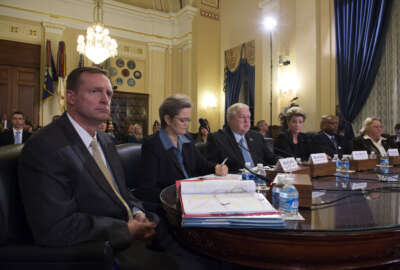Despite improvements to its verification process and customer service, the Department of Veterans Affairs remains behind in efforts to improve its program for helping veteran-owned small businesses.
Testifying before a joint House subcommittee hearing Nov. 4, Tom Leney, executive director of the VA’s Office of Small and Disadvantaged Business Utilization, shared a status update on what’s been done to address problems with the Veterans First contracting program —but lawmakers were critical of the amount of progress that’s been made since the last report.
“VA has made substantial progress in improving the verification program since the last [Government Accountability Office] report of 2013,” Leney said. “In February 2015, GAO began its newest audit of the program. In short, by the end of [fiscal] 2015, applications were being processed within the regulatory time frame 99.8 percent of the time with an approval rate of 94 percent. Initial applications were processed in an average of 41 days, well below the regulatory target of 60 days.”
VA has also started conducting post-verification audits to monitor ongoing compliance, Leney said, and the Center for Veterans Enterprise has established a process for responding to fraud allegations and conducting investigations.
Leney said the agency has also “expanded efforts to communicate with veterans about the program.” The agency has provided business owners access to more than 300 counselors, as well as expanded its website for online help and hosting pre-application town hall meetings. Leney said a transformed verification process is scheduled to be fully implemented by the end of April 2016.
The Veterans First contracting program was created in 2006 with the goal of using veteran-owned small businesses and service-disabled veteran-owned small businesses for government contracts. VA was responsible for verifying the ownership of these businesses in order to participate in the program.
CVE, according to a federal documents, “is responsible for verification operations, such as processing applications.”
To be eligible for verification under the rules, according to a 2013 GAO report:
- The small business concerned must be unconditionally owned and controlled by one or more eligible parties (veterans, service-disabled veterans or surviving spouses).
- The owners of the small business must have good character (any small business owner or concern that has been debarred or suspended is ineligible).
- The applicant cannot knowingly make false statements in the application process.
- The firm and its eligible owners must not have significant financial obligations owed to the federal government.
- The firm must not have been found ineligible due to an SBA protest decision.
William Shear, director of financial markets and community investment at GAO, said that based on some of these changes and actions, “VA has made significant improvements,” but what GAO’s preliminary observations also show, he said, is that the program “lacks a comprehensive operational plan to guide its efforts.”
While VA replaced its outdated case management system and intends to restructure its verification process and hire a director, no plan is in place that includes a schedule of actions, goals or milestone dates, Shear said.
“There’s a lot of moving pieces here, where everything is kind of going on at the same time,” Shear said. “First, you’re going to a case management system that is being tested. Then there’s development of an IT system that presumably would be based on what type of case management system you were putting in place, but that’s going on at the same time. You’re going through an organizational change at the same time, and so with those different pieces going on, and with the idea that there hasn’t been stability in senior leadership …. these types of transitions really take an awful lot of coordination. How do all the pieces fit together? We just don’t see any clarity on that.”
Mike Coffman (R-Colo.), chairman of the House Committee on Veterans’ Affairs Subcommittee on Oversight and Investigations, said the lack of an operational plan “is a serious problem, especially for an agency that runs most day-to-day businesses through contract employees rather than those within the federal civil service system.”
“It is important the CVE get this right,” he said.
But Coffman did share with the committee and witnesses that according to an OIG report for 2015, VA procurements total $91.5 billion, of which $3.9 billion went to veteran-owned small businesses, and $3.5 billion of that money went to service-disabled, veteran-owned businesses.
While that number is good news, said Rep. Richard Hanna (R-N.Y.), chairman of the House Small Business Committee Subcommittee on Contracting and Workforce, the Veterans First program “is still in turmoil.”
“Even though VA buys almost every other thing than weapons system, only a third of firms owned by service-disabled veterans registered with the [Small Business Association] are also verified by the VA,” Hanna said. “Why aren’t these companies trying to do business with the VA, the one agency directed to contract with veterans and service-disabled veterans first? I suspect that part of the answer is that it’s still hard to do business with the VA.”
Copyright
© 2024 Federal News Network. All rights reserved. This website is not intended for users located within the European Economic Area.
